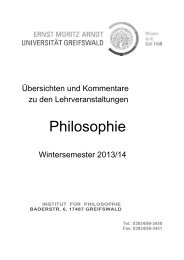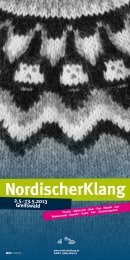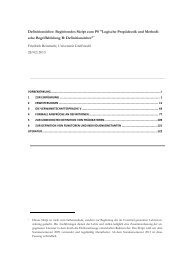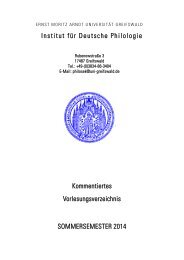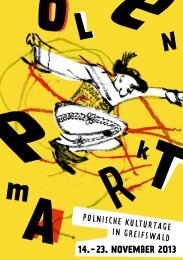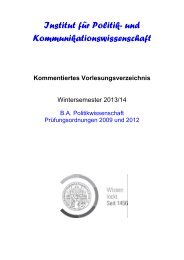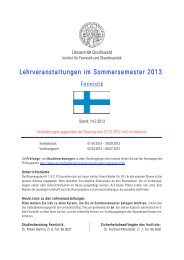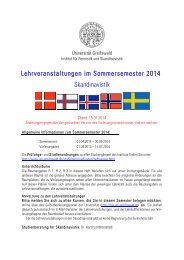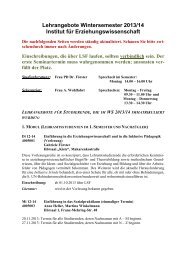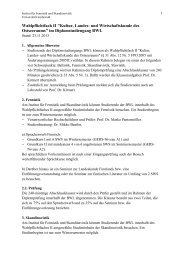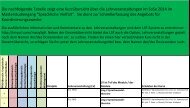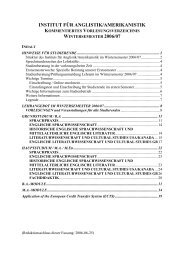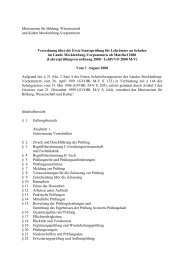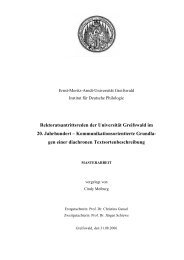ANGLISTIK/AMERIKANISTIK
ANGLISTIK/AMERIKANISTIK
ANGLISTIK/AMERIKANISTIK
Create successful ePaper yourself
Turn your PDF publications into a flip-book with our unique Google optimized e-Paper software.
Georg Christoph Lichtenberg: Aufklärung und Kritik im England und Deutschland des<br />
18. Jahrhunderts (Seminar) 4002047<br />
2 SWS ab 2. Sem. Di 14-16 R 24 Jürgen Klein & Michael Astroh<br />
Lichtenberg war einer der geistreichsten Autoren des 18. Jahrhunderts. Er wurde berühmt als<br />
Physiker an der Hannoveranisch-englischen Universität Göttingen, aber ebenso als Verfasser<br />
von Aphorismen, Essayist, Briefschreiber (z.B. Korrespondenz mit Lessing und Kant) und<br />
Herausgeber literarischer Almanache. Durch seine Reisen nach England und seine<br />
Reisetagebücher gibt er wesentliche Einblicke in Wissenschaft, Philosophie, Literatur, Sitten<br />
und Kunst des Nachbarlandes. Lichtenberg war nicht nur Fellow of the Royal Society und bei<br />
Hofe angesehen, sondern auch ein Liebhaber der Werke von Sterne und Hogarth, dessen<br />
Kupferstiche er kommentierte, wie er auch die Schauspielkunst David Garricks verehrte.<br />
Werke (in der UB vorhanden oder über FL ausleihbar): Georg Christoph Lichtenberg,<br />
Schriften und Briefe, Hrsg. von Wolfgang Promies, 4 Bände. Carl Hanser Verlag München.<br />
Für das Seminar besonders relevant: Band I und Band II (Sudelbücher und englische<br />
Reisetagebücher), Band III: Aufsätze gelehrten und gemeinnützigen Inhalts.<br />
maximum participants: 20<br />
Marlowe’s Jew of Malta; Tamburlaine; Dr. Faustus (Proseminar) 4002048<br />
2 SWS ab 2. Sem. Di 14-16 R 23 Conny Loder<br />
Marlowe is often considered to be inferior to Shakespeare, although Marlowe’s plays are just<br />
as pleasurable, stimulating and artistic as Shakespeare’s. This seminar seeks to further the<br />
appreciation of Marlowe’s plays, particularly The Jew of Malta, Tamburlaine (1 & 2) and Dr.<br />
Faustus (A-text). Students should use the New Mermaids editions.<br />
maximum participants: 25<br />
Henry Fielding: Tom Jones (Seminar) 4002049<br />
2 SWS ab 2. Sem. Di 16-18 R 34 James Fanning<br />
Tom Jones (1749) is noted for the vitality of its characters and the complexity of its plot. In<br />
following the vicissitudes of its impetuous but good-hearted hero, the novel also gives a<br />
panorama of English life in the mid-18 th century. However there is more to it than that: in the<br />
introductory chapters to the 18 ‘books’ Fielding provides the first comprehensive theoretical<br />
writing on the novel in English. We shall examine the novel both as a text in itself and as a<br />
document of the Augustan Age; also, towards the end of the semester we shall compare two<br />
film versions with Fielding’s original work.<br />
Ideally, students should buy the Norton Critical Edition (this contains comprehensive notes<br />
which will help you to understand the text, as well as a good selection of secondary material),<br />
and read the whole novel before the beginning of the semester.<br />
Recommended background reading:<br />
Watt, Ian. The Rise of the Novel ( 1 1957 and many later editions)<br />
Eagleton, Terry. The English novel: an introduction. Oxford: Blackwell 2005<br />
maximum participants: 30<br />
Shakespeare London Excursion (Proseminar) 4002050<br />
2 SWS ab 2. Sem. Mi 16-18 R 21 Conny Loder<br />
In the first week of August 2010 we will visit London and retrace the tracks of the great Bard,<br />
William Shakespeare. We will visit the Globe Theatre and other theatres (possibly fringe<br />
theatres), participate at educational events and theatre workshops and retrace Shakespeare’s<br />
steps in London. The evenings will be filled with theatre performances. Plays to discuss in the<br />
seminar and to watch in London will be announced in due time, as theatres publish their<br />
17



